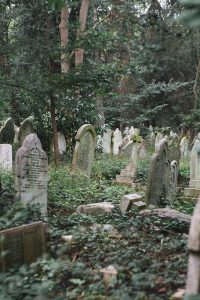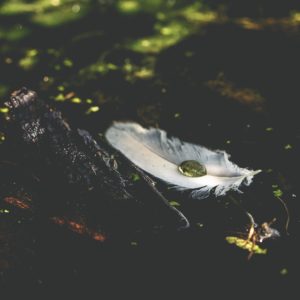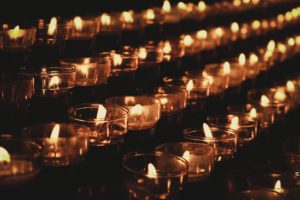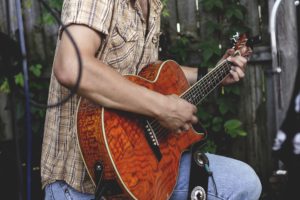by Jenny Rose | Oct 30, 2021 | Emotional Intelligence, Feelings
I lost a friend two weeks ago.
I have, of course, been thinking about her. She was a friend from my past, a part of my past. I had not seen her or even spoken with her in some time, but she remained in my memory as part of the place I called my home before I came here to Maine.

Photo by Andrew Montgomery on Unsplash
Death. The axis around which our lives pivot, and yet what can we say, or think, or even react with that isn’t entirely banal?
Starting, beginning, changing our surroundings and jobs, meeting friends and lovers, having children, reaching milestones, are all obvious, and loud, and exciting. We look ahead to such experiences, strive and work for them.
We forget that all these involve parting, too. Parting can be so quiet, like a canoe sliding from the land into the early mist on the lake. Hardly a ripple. No fanfare. Just floating soundlessly away into the unknown, while we stand on the shore, watching it disappear.
Sometimes we lie asleep in our beds during the moment of parting, oblivious. We rise, and brush our teeth, and make breakfast, watching the mist burn off the water through our kitchen window, and we realize suddenly someone or something has left us. They’re gone. We didn’t know this was the morning. We didn’t say goodbye. The inescapable moment of parting came and went without us.
Then again, parting can be so subtle we don’t recognize it’s begun. Our gaze is ahead, on the next task, the next goal. But behind us, or off to the side, out of our awareness, the time of parting, long or short, is upon us. The flow of connection has turned to an ebb, and, inexorably, we drift apart from what once moored us.
Someone put my friend on PostHope, an online place for people to schedule visits, write messages, and update on a loved one’s condition. She was unable to communicate herself, but PostHope gave us a place to send our love and support to her and follow her progress.
This was a great gift to me, so far away. I snail mailed a card she will never receive. I posted a message. I read all the updates as they came in, and there was reason for optimism, a possibility for at least partial recovery.
Then, in an idle moment I checked my email and found a message that she had died. I felt all the things we do feel in such moments. Disbelief and denial. Grief. A little later, a sorrowful peacefulness, because she would have been unable to live independently after her illness, and she was a fiercely independent woman.

By Vladimir Gladkov on Unsplash
What do we leave behind when we are gone? We talk about legacies, and children, and brilliant achievements of art or science or service, but what do ordinary people leave? My friend had no money. She had no children or close family. She lived alone. She was not famous.
In the days after her death, many posted words of sorrow and comfort on PostHope. I did not. Her place is no longer my place, and I am a different woman than the one who left. Many of her friends were strangers to me, or nothing more than names I remember from my time there. My heart is too full, and I was not ready.
I do not want to talk about her. I want to know she is still there, teaching art to children, taking a spin class, working in the art gallery, painting, dancing, and caring for the homeless cats who came far and wide for food, shelter, and love. I want to know she’s giving massages, making her herbal salves, wildcrafting sage for smudge sticks, and cooking.
But she’s gone now. Her house, which was the house in which I raised my sons before she bought it from me, is empty. She’ll never paint another picture or make another jar of salve.
I did not know, the last time I saw her and said good-bye, that it was forever. I still have a picture of that evening, but it’s color on a flat sheet of paper, and unsatisfying.
My memories are better. I still smile when I remember how we danced together, whooping and laughing, and how she tore off her shirt and danced in her sports bra as we gave ourselves to the music and our blood ran swift and hot.
I remember, too, how fascinated I was with her authenticity. She liked to talk. She was loud, and opinionated, and without tact. Her blunt honesty made people around her squirm sometimes. As a lifelong people pleaser, peacemaker, and soft-spoken fawner, she appalled me frequently, but she also amused and amazed me. How could anyone risk being so real? She taught me about living unapologetically true to oneself.
My friend had a big, soft, generous heart. She was a woman who loved and worked tirelessly for the community. That community will be less vital, less challenging, less interesting, and quieter without her.
Death is banal. But life isn’t. Hers was a beautiful life. She gave what she had to give without counting the cost. She loved. She lived without holding anything back. Now we have parted. She’s gone into the mist, beyond my sight.
Good-bye, my dear friend.

Photo by Erik Stine on Unsplash
by Jenny Rose | Jul 19, 2018 | A Flourishing Woman, The Journey
In the used bookstore in which I volunteer, I found a slim paperback book of poetry, modestly and plainly bound, entitled A Gypsy’s History of the World, by Kim Robert Stafford. It called to me and I bought it for $4.00.

Photo by Syd Wachs on Unsplash
I had never heard of this poet, but he turns out to be quite well-known and has published several books, which I’ll be looking for now. In the meantime, this book is filled with treasures.
For a couple of days I’ve been groping for this week’s post. Sometimes they come so easily, these posts. Other times I flounder. It seems that the more I have going on, the harder it is to come up with a focused essay. Irritating, but writing can be like that.
When I listen to the sound of my life this week I hear a cacophony. There are the half-excited, half-apprehensive feelings I have as the night approaches on which I’ve scheduled a local venue to once again try to start a dance group. (Will I be a good leader? Will they like me? Will anyone come?) There’s the increasing pressure I feel to find a way to earn a paycheck. There are new friends and our conversations as we strengthen our connections. (Am I talking too much? Am I offensive? Am I too blunt? Do I ask too many questions?) I’m preoccupied with family dynamics and past, present, and future possibilities and fears. (What’s the right thing to do? What’s loving? What’s useful? What will people think about me? How do I take care of everyone’s needs and expectations? How much irreparable damage will I do if I make the wrong choice?) There are my weekly activities and appointments. All the material of my daily reading swirls in my head, awaiting synthesis and integration.
In my creative world, I’m with Pele, the Earth-Shaper, sensual, passionate and angry. This week others will come to dance with her, to make offerings, to propitiate and reconnect. Revolving around her are other characters: Rumpelstiltskin the dwarf; Poseidon, the Greek god of the sea; a little brown bat called Ash and his companion, a bark beetle; the eldest of the twelve dancing princesses, Ginger; an old woman, Heks, apprentice to Baba Yaga; and Persephone, who comes to drum for the dance.
All this, and I can’t come up with a thing to post about.
I know this dynamic. The more pressure I put on myself, the harder I try, the more elusive inspiration will be.

Photo by Pascal Müller on Unsplash
It’s a foggy morning here in Maine. Foggy and oppressive with high humidity and a threat of severe weather this afternoon. I’m planning on meeting a new friend for a walk and then I’ll swim. I decided to stop trying to write a post. I turned off all the lights up here in my little attic space and lit a candle. I picked up A Gypsy’s History of the World and turned back to the beginning of the book.
Duets
A dream flips me into the daylight.
I pry my way back:
a door opens, I enter, never
escape; the jailor sings by morning
duets through the bars with me.
I wake and out my window
by dawn a blackbird sings and
listens, sings and listens.
Listen. Thistledown jumps its dance
in the wind. I’m small and have
no regrets. Yesterday is a temporary
tombstone, a hollow stalk
on the hill. I’m putting my best
ear forward; in the space between songs
I’m travelling. My hands make
whistling wings in the wind.
No things meet without music:
wind and the chimney’s whine, hail’s click
with the pane, breath in a bird’s
throat, rain in my ear when I
sleep in the grass. I miss the
whisper of a swallow’s wings
meeting the thin air somewhere far.
Branches of my voice, come back.
Inside each song
I’m listening.
At once the cacophony in my head faded away, no more than the murmur of the trees and breeze or the ocean’s breath. For a few minutes, I thought about being small and having no regrets, let alone imagining future regrets. Yesterday and yesterday and yesterday, all temporary tombstones. All my yesterdays add up to almost 20,000 hollow stalks on a hill. And yes, activities and schedules, efforts and appointments, hopes and fears, words and information, friends and family, the way the shadowed ceiling looks in a sleepless hour and the path of silent tears on their way to my pillow. All of that. But I forget about the space between all those songs. I forget that I’m traveling through this place, this life, and these landmarks.

Photo by Dakota Roos on Unsplash
Sometimes I forget to just listen to life’s music, just witness, just be present and still. Sometimes I forget to fold my hands in my lap and watch the wavering shadows the candle makes inside the song of my life. The song will not be endless. One day it will be yesterday’s song, held in a hollow stalk on a hill. I can’t reach out my hand and clutch it, pin it down, record it and make sense of it. I don’t need to. I don’t want to.
Today, friends, I’m listening.
My daily crime.
All content on this site ©2018
Jennifer Rose
except where otherwise noted
by Jenny Rose | Jun 14, 2018 | Connection & Community, Emotional Intelligence

Photo by James Coleman on Unsplash
Saturday night I attended a monthly open mic event called The Coffeehouse. It took place in the basement of a local church, which is also where our Tai Chi group meets. People came from far and wide to participate. I was there to tell stories for the first time since I came to Maine.
My partner came with me, and I knew two other people there from Tai Chi. Otherwise, everyone was a stranger. I sat quietly in a corner and watched the place gradually fill up. I could see many of these folks were old friends. In fact, during the course of the evening I learned that The Coffeehouse has been happening for more than 20 years in that very basement, hosted by the same man since the beginning. I heard stories, both on mic and off, of cancer, divorces, moves, jobs, remarriage and grandchildren.
Cases were opened and out came guitars of every description. Musicians sat together, teaching one another chords and fingering, and playing together. Ragged sheet music, song lyrics and notes lay on every table. In front of the mic, I heard about being a cafe musician, playing music for weddings, and stories from a couple who composes, writes and performs music together, splitting their time between Arizona and Maine.

Photo by Brandon Wilson on Unsplash
One man stood up and read a short story he’d written. Another gave a hilarious rendition of a Shel Silverstein poem I used to read aloud myself as an elementary school librarian. Yet another read one of his own poems in between playing his guitar. A woman performed on her autoharp.
Many of the performers expressed nervousness, but each was volubly supported by the audience. Jokes were cracked, stories exchanged. Everyone was applauded warmly, including me.
When it was my turn, I stood before them, my heart throbbing uncomfortably in my chest, looking out at a roomful of faces I’d never seen before. I introduced myself briefly and told a short peace tale from China, followed by a longer story from Jane Yolen. The audience was generous, attentive. The poignant memory of other, more familiar audiences in my old place caught at my throat. As I wove the stories, I looked from face to face, speaking directly to each one as though we were alone. Their expressions softened as they entered into the stories with me, seeing what I was seeing and feeling what I was feeling. I know my own face wore exactly that expression as I listened to their music and songs.
Each performer took his or her fifteen minutes or so to share their art. It was a long night. In fact, it started about the same time I like to be heading for bed. Yet that evening fed something in me that’s been starving for three years. I had a strange sense of coming home, of belonging and kinship.

Photo by Andrew Loke on Unsplash
My partner and I talk a lot about community, how essential it is, how to create it, how to join it and how to support it. I believe, as humans, we must find some kind of community to meet our connection needs if we want to live well. We’re social animals, and I think we’re beginning to see the high cost of isolation and disconnection play out in suicide rates, violence and addiction.
The Coffeehouse clarified for me an aspect of community I haven’t really discerned before. Right now, the world is chaotic and increasingly complex. We’re faced with serious issues and changes we’re ill-equipped to deal with. I’ve been thinking about the local food movement, grassroots politics, permaculture, and alternative energy and housing through the lens of community. All of those issues are vitally important, and becoming more so by the day, but I’ve been skipping over the most important thing community can give us, the aspect that must be present, supported and nurtured before any kind of problem solving or effective organization can happen.
The Coffeehouse is, essentially, an adult playgroup. I heard nothing about diet, gun control, immigration, politics or climate change. I heard nothing about social justice or gender politics. We all shared the same bathroom, the same coffee and snacks. We all put a voluntary donation in the basket. Instruments were shared. We shared time, microphones, personal stories and creativity. There was no talk of cultural appropriation.
We laughed together.
We played together.
We were kind and generous with each other.
We took turns.
As I sat there watching it unfold, it occurred to me to wonder how we’re ever going to manage to address all the pressing problems in the world today if we can’t come together as human beings and play with one another first. How do we find our way to collaboration and cooperation unless we build trust and respect and are able to just have fun together? The Coffeehouse showed me humans at their best. Heck, I was at my best. In such a warm and supportive atmosphere, my social anxiety was not disabling. People talked to me, welcomed me, expressed appreciation for the stories and received my appreciation for their contribution in return. I recognized several who performed were more nervous than I was. None of us were hiding behind technological screens. There was no escaping a forgotten lyric, the wrong chord or symptoms of performance anxiety. One of the musicians talked ruefully about a new tremor in his hands that impeded his playing. We could all see it. He played anyway.
In the days since The Coffeehouse, I know I’ve found something I’ve been looking for since I came to Maine. I thought I just wanted a place to share stories again, and I do, but this gathering is about something much bigger than that. This is about mutual authenticity, creativity, contribution and play. It’s about friends. It’s about celebration and connection in the midst of a dark and stormy time.
I can hardly wait for the next one.

Photo by rawpixel.com on Unsplash
All content on this site ©2018
Jennifer Rose
except where otherwise noted








